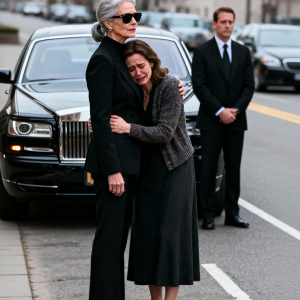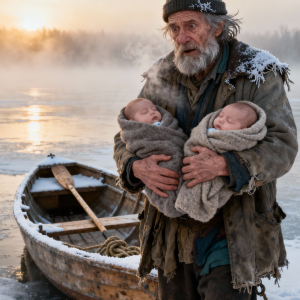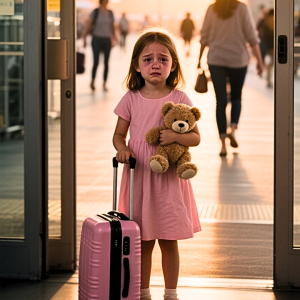
The ballroom of the Ritz Haven Hotel glittered like a dream. Golden chandeliers shimmered above a sea of silk gowns and tuxedos, laughter echoed against marble walls, and a grand orchestra filled the air with soft, elegant music. It was the most anticipated charity gala of the year in New York City — where wealth and status met under the guise of generosity.
No one noticed the little boy crouched near the chocolate fountain, nervously clutching a paper cup of juice.
His name was Eli Turner, four years old, one of a dozen orphans invited from St. Andrew’s Home for Children. His sneakers were scuffed, his shirt slightly wrinkled, and a red napkin was tied around his neck like a superhero’s cape. Yet his eyes — wide, bright, and full of wonder — shone brighter than the chandeliers.
“Miss Carla,” Eli whispered to his caretaker, “do you think heroes come to fancy places like this?”
“Maybe they do, sweetheart,” she smiled. “Why do you ask?”
“Because I’m gonna be one when I grow up,” he said proudly. “I’m gonna save people.”
Across the ballroom, Ava Reynolds, 30, the youngest billionaire in the city and founder of a global tech empire, was surrounded by cameras and conversation. On the surface, she had everything — success, beauty, influence. But lately, her life felt like a glass box: glamorous from the outside, hollow within. Every smile she gave was rehearsed; every laugh, a performance.
When her assistant reminded her to greet the children from St. Andrew’s, Ava sighed softly. “Of course,” she murmured, straightening her diamond bracelet before walking toward the group.
And that’s when she saw him — the boy with the napkin cape.
He looked up at her, his face full of awe. “Hi,” he said. “You look like a queen.”
Ava laughed, a sound she hadn’t made in weeks. “And you, sir, look like my royal guard.”
“I’m not a guard,” Eli said seriously. “I’m a superhero. I protect people — even rich ones like you.”
The crowd chuckled at his innocence, but Ava didn’t. She felt something inside her soften — a feeling she hadn’t allowed herself to feel in a long time. “Well then,” she said, kneeling gracefully, “thank you for protecting me, Mr. Superhero.”
Hours passed. The gala continued with music and dancing. As the orchestra began a slow waltz, Eli tugged gently on the hem of her silver gown.
“Miss Ava?”
“Yes?”
“Do heroes dance too?”
She smiled. “Sometimes — when they’ve saved the day.”
He tilted his head. “Can I dance with you then?”
The room fell silent. Dozens of powerful guests — CEOs, celebrities, politicians — watched as one of the richest women in America bent down, took the small boy’s hand, and led him to the center of the ballroom.

Ava placed his tiny feet on hers, guiding him gently as they moved to the music. Laughter filled the room, soft and sincere. Cameras flashed, but for once, she didn’t care. For the first time in years, she felt… human.
When the music ended, Ava knelt again. “Where are your parents, Eli?”
He looked at her with a puzzled frown. “I don’t have any.”
The words hit her like a whisper in an empty room. That night, long after the gala lights dimmed, Ava couldn’t forget his voice — or the sadness behind his smile.
Days turned into weeks, but Eli lingered in her thoughts. Finally, one rainy night, Ava found herself outside St. Andrew’s Orphanage, headlights cutting through the drizzle. The building was old, the paint peeling, the playground empty.
A gentle-faced nun, Sister Helena, answered the door, startled. “Miss Reynolds? Oh my… we didn’t expect a visit.”
“I met one of your boys,” Ava said quietly. “Eli Turner.”
Sister Helena smiled softly. “Ah, our little superhero.”
They walked through narrow halls filled with children’s laughter and drawings. In one small room, Ava saw Eli fast asleep, his tiny hand clutching a broken toy car. On the wall above his bed was a crayon drawing: a stick boy in a red cape holding hands with a tall woman in a long gown. Underneath, he had written, ‘Me and the Lady from the Party.’
Something inside Ava cracked open.
She sat beside his bed, brushing a stray curl from his forehead. When he stirred awake, his sleepy eyes blinked at her. “Miss Ava? Did I save you again?”
Her voice trembled. “Maybe you did, Eli. Maybe you did.”
From that night on, Ava visited every week. She brought books, fixed the playground, and funded the children’s meals. But it was Eli who ran to the gate every time she arrived — his cape flying behind him, arms wide open.
Months later, the orphanage received devastating news: it was being shut down due to city budget cuts. Sister Helena cried; the children would be separated and sent across the state.
When Ava heard, she stood silently for a long time, her expression unreadable. Then she said, “Not while I’m alive.”
Within a month, The Reynolds Foundation for Children was born. Ava bought the entire property, renovated it, and guaranteed permanent funding. On the reopening day, reporters swarmed the courtyard as she gave her speech.
Halfway through, Eli burst from the crowd, shouting proudly, “I told you I’d save people one day!”
The audience laughed and applauded. Ava knelt, cupping his face gently. “You already did, hero,” she whispered.
The cameras caught the moment — the billionaire kneeling before a little boy in a cape.

And for once, the richest woman in the room wasn’t the star.
The little boy with the paper cape was.




